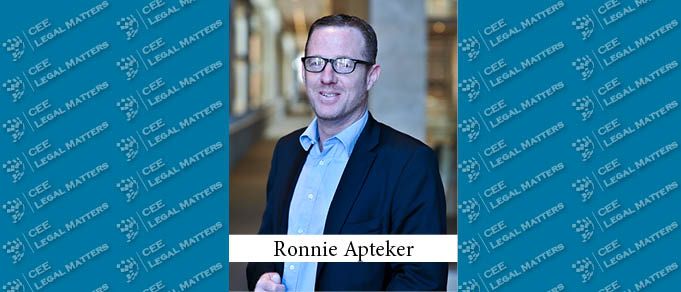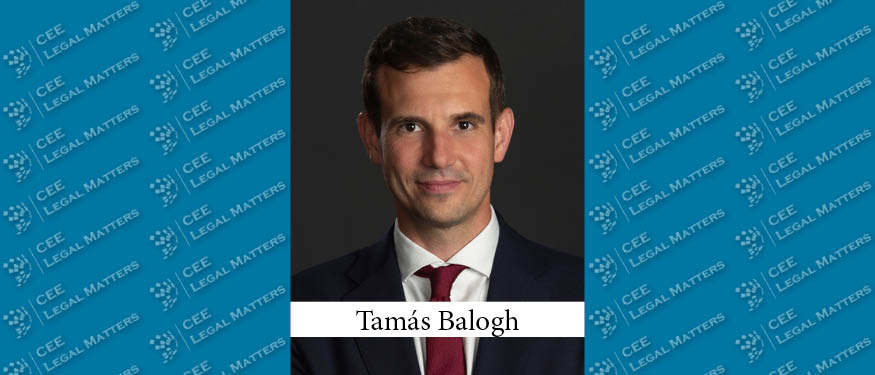Ronnie Apteker is a South-African born entrepreneur, author, and filmmaker. He founded the first Internet Service Provider in South Africa, which is now part of the world’s largest TelCo, Japans’s NTT. He has made Kyiv his second home, and is currently busy with a documentary film project about the IT landscape in Ukraine. We asked him to share his thoughts about Kyiv – many of which, it turns out, apply elsewhere in CEE as well.
Our plane touched down as the light was disappearing late on a snowy afternoon that cozy winter. My friend Jacques and I were in for a life-changing adventure. It was dark when we reached the terminal and I remember the old Soviet-style airport and thinking to myself, “Where the hell are we?” After a couple of days in the city we fell in love. No, not with each other – with Kyiv. That was 12 years ago and it was then 4 hryvnia to the US dollar. It was a time of hope and enthusiasm and dreams. Since then there has been a global financial crisis and the Maidan revolution, and the war with Russia (which is still going on). It is now 25 hryvnia to the US dollar and the European economy is in a tough place. And with all of this, the mood in Ukraine is currently optimistic and the energy in Kyiv is magical. I love being there.
A few years ago I bought an apartment in Kyiv and have been spending at least half of each year there since. After Maidan a lot has changed. Eating out in Kyiv has become a real treat. I have over a dozen favorite restaurants, and more keep coming. In the past couple of years Kyiv has developed in such fantastic ways, and the city was already cool. People keep referring to it as “the next Berlin.” And now, since May, the new president has brought renewed hope – he appears to be saying all the right things. Time will tell whether he is the real deal or a false prophet. Ukraine could go backwards if the new leader turns out to be another money-grabber, but I want to believe he is going to act on the things he says. I think the rest of the country wants to believe this too. If he does deliver on his promises I am of the view that Ukraine is going to fly. Time will tell. I think we need to relook at the mood in Kyiv in about six to nine months. He just got the job, so he needs a bit of time. I am optimistic.
I was born in Cape Town, in South Africa, but have lived in other parts of the world too. My working life began in Johannesburg and that city shaped a big part of my career. Sadly, South Africa has many problems, like the growing violent crime nightmare, the failing electricity provider, and a state capture disaster which has cost the country an untold fortune. The list goes on. This is a subject for a whole other story. I mention this because when I am in Kyiv no one talks about crime, or electricity outages, etc. I feel safe walking around Kyiv’s wonderful streets. You see new cool spots popping up all over the place. It is a great time for entrepreneurs to be dreaming. But, doing business in Ukraine is not for the faint-hearted. One needs a thick skin and a healthy sense of humor.
I have many Ukrainian friends, and most of them are entrepreneurs. My very close friend Michael Kharenko, who co-founded the fantastic Sayenko Kharenko law firm in Ukraine, is a lawyer turned entrepreneur. Michael is a machine. He works hard and he knows how to laugh with his soul. A lawyer with a sense of humor is my kind of lawyer. He certainly cares deeply about people and likes to see people smile. In my experience, all his team is hardworking, enthusiastic, and honest. And there is a tremendous creative spirit in Kyiv that constantly captures my imagination. The talent I have witnessed is often incredible. But there is a cultural challenge. And there is a lack of understanding of what it means to be a professional. Remember, customer service is not something that existed as a concept in this part of the world just a couple of decades ago, and the idea of ownership is also relatively new. Combine this with a lack of role models and mentors, and what you have is an unpolished and often misunderstood style of doing business. When I look at my friend Michael’s law firm – without a doubt one of the best firms in Ukraine – I often call him aside and try to whisper things in his ear. I guess you could say I am a kind of informal mentor. “Why doesn’t anyone knock on a door before they enter a meeting room?” I ask Misha. “And why do people there often say to me ‘nice to meet you,’ when they have met me dozens of times?” None of this is a crime, of course, but, if you want to be more world-class, then you need to behave world-class, especially when it comes to interacting with foreigners.
In my view, the former Soviet countries don’t yet understand the difference between professionalism and talent. Just because someone is a creative wizard, and puts in long hours, and is full of beans, doesn’t mean they are professional. Notice how people in Ukraine very rarely write stuff down? Or how being on time is a challenge? Or how people assume way too much? This all leads to frustration, and ultimately means that expectations are not met. And this is unprofessional. A professional writes things down, and communicates, and is punctual and manages expectations. It is not about attitude – I feel the attitudes in Kyiv are always positive and people want to work hard. It is about a simple lack of understanding and experience that will in time develop and make it easier to get things done. I have learned to over-communicate because people don’t often confirm things, and this leads to balls being dropped. None of these challenges are based on anything negative. It will simply take patience and guidance for Ukrainians to embrace more Western standards. I have seen a lot of progress in the past few years, and some of the new restaurants in Kyiv are a testimony to that. But God help you if you go to a place with an old-school vibe, as you can stand on your head before a waiter will come to your table.
As an entrepreneur, my biggest activity is to sell. My entrepreneurial friends in the UK or in the US are always selling. Whether it is actual selling, as in knocking on doors, or trying to raise capital, or attracting new talent, or inspiring a journalist. Selling and pitching is what we do. We are always trying to elevate the mission and share our passion. But selling makes one vulnerable. Cold calling, for example, is not for everyone, but every entrepreneur has to do this at some point. This is how you land your first customers. So, yeah, it can suck. People tell me to get lost often. It is never fun, but it is not personal. When someone does show interest, my face lights up, and when we make a sale, we are buzzing. The feeling is always fantastic. But the ex-Soviet countries don’t know how to sell. Ukraine can’t even sell itself. India has done it. And Malaysia. Croatia and Montenegro too. We have all seen ads on TV and billboards in airports. But where is Ukraine – a country with so much to offer? And please don’t tell me about the “Ukraine Now” campaign – that appears to be nowhere. The Facebook page has 1600 likes. I think my mom has more likes than that. Ukraine and Ukrainians need to start selling. Until this happens the entrepreneurs I keep meeting are going to continue to be frustrated. If you want to do business in the West and compete in the world out there, then you need to start knocking on doors and learning to sell. Being vulnerable is at the heart of entrepreneurship and selling. And this is not something that old Soviet culture allows for. In my view, we need to see a total break from this iron mindset.
Why I think the struggle is worth it is simple: Soul. Ukrainian people are warm and kind. And from my experience, they know how to laugh with their entire soul. A sense of humor is an important thing in my view, and I laugh a lot in Kyiv. People are funny. And they love to laugh. Yes, the language thing remains a challenge, but many more people are speaking English than 12 years ago. Also, in the domain I work in, just about everyone I meet speaks English. I am talking about the world of IT, which I think is now Ukraine’s second biggest contributor to GDP after agriculture. Ukraine today is the second biggest software outsourcing nation after India. Considering that just about every company in the world needs software to be developed, I believe that Ukraine is in a very exciting position. But, until Western professionalism is more of the norm, I know that there will be many frustrations when it comes to dealing with Ukrainians.
Again, when I think of my visits to law firms and the many IT companies in the city, my soul smiles, because I know they care and are trying. But they need mentors. If Ukrainians want to compete in the West, they need to embrace Western professionalism. Their hearts are in the right place, but culturally, they will continue to be frustrated for years to come. And so will we. At least everyone has a good sense of humor, and so do I, so it can also be a lot of fun. I remember having a discussion about an opportunity during a visit to Sayenko Kharenko and making some comment like, “wow, that really opens a door.” And I am convinced there are a bunch of people still looking for this door. Ok ok, that is a silly joke, but English is full of nuance and expression, and this makes life in Kyiv very colorful.
I encourage you to come visit Kyiv. You will love this city. It is beautiful and the people there are spirited and soulful. You will be amazed when you eat out, and it is not expensive, compared to major Western cities. If you are an IT entrepreneur and you have not yet heard about the software talent of Ukraine then you owe it to yourself to come and explore this amazing place. Kyiv is a culturally-rich city. And it is not small – it normally takes a person a full week to walk and explore all that the city has to offer. The architecture and the old buildings are quite something, and there is always something cool going on, every week of the year. Yes, Kyiv is one very cool city.
CEE Legal Matters would like to thank Vladimir Sayenko of Ukraine’s Sayenko Kharenko Law Firm for introducing us to Ronnie Apteker.
Ronnie Apteker
This Article was originally published in Issue 6.10 of the CEE Legal Matters Magazine. If you would like to receive a hard copy of the magazine, you can subscribe here.

















